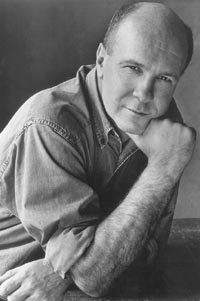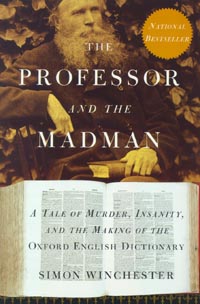Program will bring authors to teach their writing craft
Jennifer LeovyNews Office
 Author Simon Winchester will teach a narrative nonfiction writing course starting in Winter Quarter, as the Writer-in-Residence program begins. Winchester is the author of The Professor and the Madman, A Tale of Murder, Insanity, and the Making of the Oxford English Dictionary. |
About a year ago, Vare conceived and decided to fund a new non-fiction writer-in-residence program in the College, which will begin Winter Quarter with the University’s first course on narrative nonfiction writing, titled “The Art and Craft of Storytelling.” Simon Winchester, the author of The Professor and the Madman, A Tale of Murder, Insanity, and the Making of the Oxford English Dictionary (HarperCollins Publishers, 1998), will teach a small group of undergraduates his techniques for combining factual reporting and good storytelling.
“Nonfiction writing belongs with other literary disciplines as a serious, intellectual pursuit,” said Vare, who recently joined The Atlantic Monthly as a senior editor charged with bringing long-form narrative nonfiction to the magazine. “It has a rich tradition and is as deserving of study as other genres such as fiction, poetry or playwriting.”
Vare, who has been a top editor for The New Yorker, The New York Times Magazine and Rolling Stone, believes that although there is no single way to write narrative nonfiction, that each writer-in-residence will share the goal of helping students increase their observational skills and develop techniques for telling a good story in a compelling voice––elements of literary journalism students can apply to any kind of writing.
“We are grateful to Robert Vare for his dedication to the writing programs in the College,” said John Boyer, Dean of the College. “Because of his commitment and vision, we are able to create this path-breaking venture in our writing curriculum.”
Vare will tap his network of prominent journalists, bringing a writer to campus for one or two quarters every year for the next five years. “We are going after the best nonfiction writers in the world,” said Vare.
Jonathan Harr, who received the National Book Critics Circle Award for his best seller, A Civil Action (Random House, 1995), has agreed to follow Winchester as the second writer-in-residence, according to Bill Brown, Master of the Humanities Collegiate Division.
“We will have some fabulous writers coming to campus,” said Brown. “Our first writer, Simon Winchester, is perfect for us. In The Professor and the Madman, Winchester turned research and the pursuit of knowledge into a gripping story for hundreds of thousands of readers. Our students are sure to identify with Simon, given his love of words, history and the politics of place,” Brown added.
 |
Several years ago, after winning a Nieman fellowship to Harvard University for journalism, Vare returned to the academic community, teaching nonfiction-writing courses for professional writers at Harvard University, for graduate students in journalism at Columbia University and for undergraduates at Yale University.
“We are beginning to see more universities offer this kind of course,” said Vare, who has written for The New York Times Magazine, Esquire and The New Republic, among other publications. “I believe that trend will continue because this kind of writing is heady stuff for the reader. We all want to hear a good story, but when we are confident that it also is true, there is a double allure that connects us to the story in a way that can be even more powerful than fiction.”
Vare said he will continue to seek a rightful place in the academy for literary journalism, side-by-side with fiction, poetry or playwriting. And sharing it with a new generation of Chicago students “gives me the opportunity to bring together two of the things I most value––great narrative writing and the University of Chicago,” Vare said.
![[Chronicle]](/images/small-header.gif)